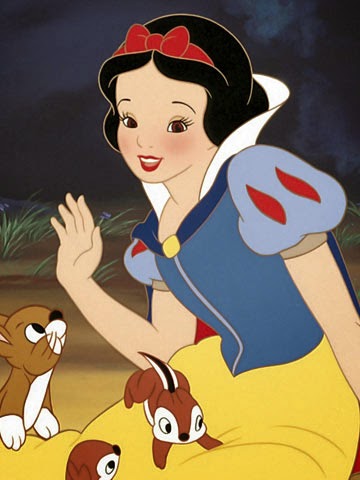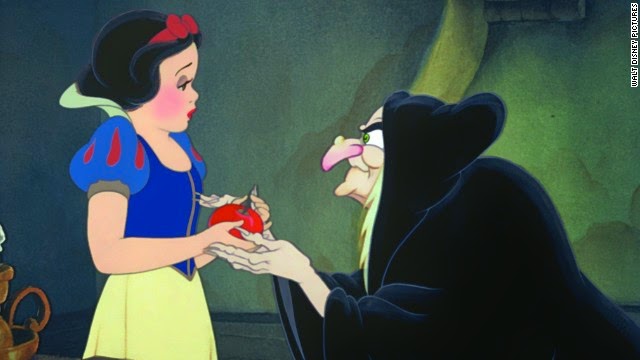Country: USA
Based on: Snow
White by the Brothers Grimm
Director: David Hand (supervising)
Producer: Walt Disney / Made by Walt Disney
Productions / Distributed by RKO Pictures
Screenplay: Ted Sears and seven screenwriting dwarfs
(no really, there were 8 screenwriters)
Voices: Andriana
Caselotti, Lucille Le Verne, Harry Stockwell
Length: 83 minutes
Summary/Logline:
A beautiful young
princess flees the narcissistic, homicidal rage of her Queen mother and takes
refuge with an eccentric group of forest-dwelling little people en route to
meeting her Prince Charming.
Background/History
On the heels
of Disney’s hugely popularly Silly
Symphonies shorts, Snow White was not only Walt’s first animated feature,
but the first animated feature, period. Filmed on a budget of $1.5 million, it
initially raked in $8 million and another $408 million since, making it one
of the top ten highest grossing films in North America (when rated for
inflation). Before its release, naysayers considered it little more than an
outrageously priced flop-to-be. But Disney had faith, and he mortgaged his house
to prove it.
 Production
started in the summer of 1934 with mostly untrained animators whose only
professional experience was as newspaper cartoonists. To make sure his crew was
up for the task, head animator Art Babbit held classes in his home using a
female model. While the dwarfs were the film’s primary selling feature, the heart of the story was Snow White’s rocky
relationship with her stepmother, the Queen. Eager to strike a balance between
comedy and drama, Walt ensured the movie would make audiences laugh, scream and cry
in equal measure. The film was
re-released every seven to ten years between 1944 and 1993, when it became the
first film ever to be digitally restored.
Production
started in the summer of 1934 with mostly untrained animators whose only
professional experience was as newspaper cartoonists. To make sure his crew was
up for the task, head animator Art Babbit held classes in his home using a
female model. While the dwarfs were the film’s primary selling feature, the heart of the story was Snow White’s rocky
relationship with her stepmother, the Queen. Eager to strike a balance between
comedy and drama, Walt ensured the movie would make audiences laugh, scream and cry
in equal measure. The film was
re-released every seven to ten years between 1944 and 1993, when it became the
first film ever to be digitally restored.
Winner of an
honorary Oscar in 1939 and nominated for Best Musical Score, largely due to classic songs like Some Day My Prince Will
Come, Whistle While We Work, and
Heigh Ho, Snow White’s profits
were used by Disney to finance the now-legendary Walt Disney Studios in
Burbank, California. Over the next 16 years, Disney would forever cement
himself in the popular imagination with classics like Pinocchio, Fantasia, Dumbo, Bambi, Alice in Wonderland and Peter Pan.
Trying to
pin down Disney’s influence on cinema and society, never mind on me
personally, is roughly the same as trying to summarize the value of air. I can’t
remember a time when Disney wasn’t a major part of my life and a fundamental artistic influence.
Nor for that matter do I particularly want to. When I’m feeling blue and need
me a good pick-me-up, Disney films are still my number one go-to. Walt’s much-chronicled
journey from school newspaper cartoonist to roadblock-jumping businessman to shaper
of dreams is legendary, a roadmap of perseverance and self-belief if ever
there was one. (P.S. I cannot recommend Neal Gabler’s Walt Disney: The Triumph of the American Imagination highly enough.)
His inexhaustible desire to transform the American cultural landscape, on display in his films, theme parks, television programs, and more, was
both unprecedented and unparalleled, except by history’s other notable (if not
so noble) emperors.
 And yet
despite his insatiable commercial appetite and grand ambition, he never lost
sight of what mattered most: touching, well-crafted, highly entertaining
stories rooted in ancient archetypes and popular fairy tales that somehow managed
to appeal to everybody. And of course, I do mean everybody.
So deep was his influence that nearly half a century after his death in 1966, The
Walt Disney Company is still spinning cinematic gold out of Walt’s original
vision. Sure, the journey hasn’t been without a few dry spells, and one
can’t ignore the revival that was Pixar, but on the whole, Disney has remained an
institution and inspiration for millions of aspiring storytellers, animators, and
filmmakers, not to mention that little kid in all of us.
And yet
despite his insatiable commercial appetite and grand ambition, he never lost
sight of what mattered most: touching, well-crafted, highly entertaining
stories rooted in ancient archetypes and popular fairy tales that somehow managed
to appeal to everybody. And of course, I do mean everybody.
So deep was his influence that nearly half a century after his death in 1966, The
Walt Disney Company is still spinning cinematic gold out of Walt’s original
vision. Sure, the journey hasn’t been without a few dry spells, and one
can’t ignore the revival that was Pixar, but on the whole, Disney has remained an
institution and inspiration for millions of aspiring storytellers, animators, and
filmmakers, not to mention that little kid in all of us.
But I
digress. Snow White, Disney’s bold first kick at the can must have hit audiences like a comet. Funny, moving,
visually mesmerizing, and narratively rich, it tells the simple story of a young
woman handed one shit sandwich after another who absolutely refuses to let it bring
her down. Ignore for a moment that she spends a good share of her time cleaning up after
men, for to do otherwise would miss the deeper message. Independent,
resourceful, generous and genuinely happy
all at the same time, she’s about as close to a perfect female role model - or role model, period - as I
can imagine. Sure, she wouldn’t mind a Prince Charming in her life (is that a
bad thing?), but she's clearly able to manage just fine on her own in the meantime. The
dwarfs are cute and hilarious, the Queen is suitably wicked, and
Prince Charming is, well, charming. But it’s Snow White herself that
steals the show, and I love her for it.
Too often,
we roll our eyes at Disney’s myriad pretty princesses, superficially viewing
them as some kind of affront to feminism. But I would argue the opposite: that
there is no other filmmaker or studio in history that has so consistently placed
strong, heroic female leads at the center of their stories, and who who almost always
save the day. Think Alice, Pollyanna, Mary Poppins,
Miss Bianca, Ariel, Belle, Pocahontas, Mulan, Nani and Lilo, Mia, Giselle,
Tiana, Rapunzel, Merida, and most recently, Elsa – never mind their many sinister
and colourful female antagonists. In this way among many others, Walt Disney
was a kick-ass, cutting edge innovator.
At the same time, I love Snow White’s unbridled zest for life, her Buddha-like ability to revel in the moment, and the story's emphasis on
the elevating power of friendship and community in the face of overwhelming
evil. It’s a massively entertaining and elegant film with a beautiful message,
uplifting tunes, and wholesome laughs. And these days, who couldn’t use a bit more of that?
When I was growing up, Snow White was the Disney princess I could identify with most. She always focused on the positive even when things were truly bleak. She loved animals and they loved her back. (Bonus: they sang with her and helped clean the house!). She had a thing for apples. And she was always so darned polite!
 But what surprised me most about seeing Snow White and the Seven Dwarfs again after all these years was how truly independent and full of joy she comes off in the film - not just as a woman, but as a human being. She's not bothered by what others think she should be, one way or the other; she just is. She doesn't clean and cook and sweep because it's expected of her as a woman; she does it because she genuinely enjoys it. Intentionally or not, she stands for all women who may, in the end, find their truest joy in a role society now sadly deems "stereotypical" and "sexist": that of homemaker, mother, and hostess.
But what surprised me most about seeing Snow White and the Seven Dwarfs again after all these years was how truly independent and full of joy she comes off in the film - not just as a woman, but as a human being. She's not bothered by what others think she should be, one way or the other; she just is. She doesn't clean and cook and sweep because it's expected of her as a woman; she does it because she genuinely enjoys it. Intentionally or not, she stands for all women who may, in the end, find their truest joy in a role society now sadly deems "stereotypical" and "sexist": that of homemaker, mother, and hostess.
There's also a great little message about how karma works. Snow White sends love out into the world and it comes back to her in multiples of seven - plus Prince Charming! She radiates joy and the people around her can't help but reflect it back. I love that. I know life doesn't always work that way, but Snow White is a good reminder that it can if we're willing to risk throwing a little positive energy out there every once in a while. Whether we get a Prince Charming in the end or not, that just seems like a better, and certainly a happier, way to live.
 But what surprised me most about seeing Snow White and the Seven Dwarfs again after all these years was how truly independent and full of joy she comes off in the film - not just as a woman, but as a human being. She's not bothered by what others think she should be, one way or the other; she just is. She doesn't clean and cook and sweep because it's expected of her as a woman; she does it because she genuinely enjoys it. Intentionally or not, she stands for all women who may, in the end, find their truest joy in a role society now sadly deems "stereotypical" and "sexist": that of homemaker, mother, and hostess.
But what surprised me most about seeing Snow White and the Seven Dwarfs again after all these years was how truly independent and full of joy she comes off in the film - not just as a woman, but as a human being. She's not bothered by what others think she should be, one way or the other; she just is. She doesn't clean and cook and sweep because it's expected of her as a woman; she does it because she genuinely enjoys it. Intentionally or not, she stands for all women who may, in the end, find their truest joy in a role society now sadly deems "stereotypical" and "sexist": that of homemaker, mother, and hostess.There's also a great little message about how karma works. Snow White sends love out into the world and it comes back to her in multiples of seven - plus Prince Charming! She radiates joy and the people around her can't help but reflect it back. I love that. I know life doesn't always work that way, but Snow White is a good reminder that it can if we're willing to risk throwing a little positive energy out there every once in a while. Whether we get a Prince Charming in the end or not, that just seems like a better, and certainly a happier, way to live.


.jpg)






.jpg)







.jpg)



